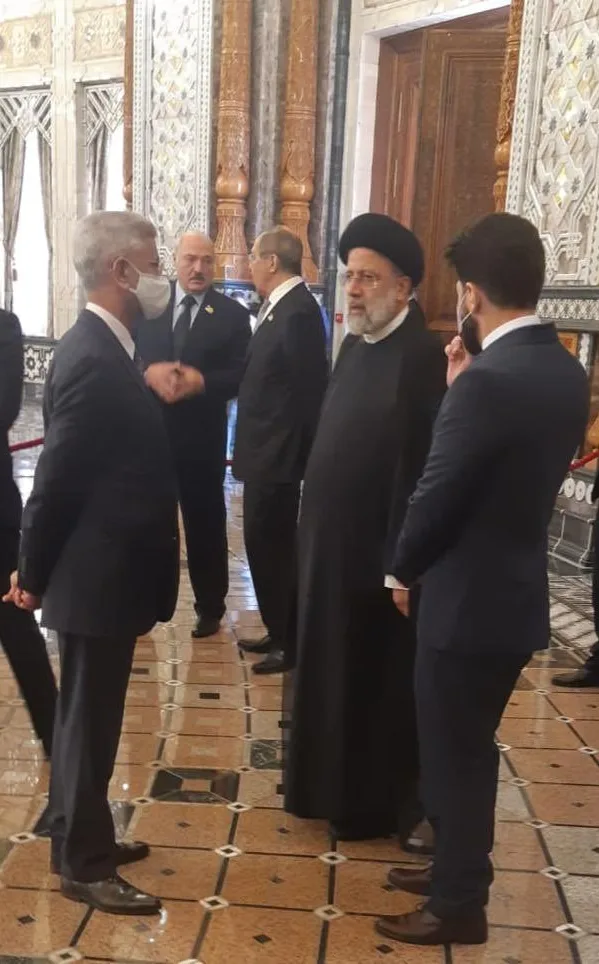

External Affairs Minister S Jaishankar with Iran President Ebrahim Raisi on the sidelines of the SCO Summit in September (Image courtesy: Twitter/@DrSJaishankar)
<p>
<strong>Iranian President Ebrahim Raisi&#39;s&nbsp;mantra&nbsp;on&nbsp;working together with regional countries, without interference from foreign powers is being advanced by his two key lieutenants – foreign&nbsp;minister Hossein Amir-Abdollahian and the boss of&nbsp;the country&#39;s&nbsp;Supreme National Security Council (SNSC), Ali Shamkhani.</strong></p>
<p>
<img height="1" src="file:///C:/Users/Dell/AppData/Local/Temp/msohtmlclip1/01/clip_image001.gif" width="1" />In New Delhi for the regional security dialogue on Afghanistan on Wednesday, Shamkhani called for regional synergy and cooperation among Afghanistan&#39;s neighbours as the growth of Daesh (ISIS) and Takfiri (a radical Muslim who excommunicates other Muslims, or accuses them of apostasy) jihadists poses a real threat to the peace in the region.<br />
<br />
The other danger highlighted by the Iranian Rear Admiral, who is also a former defence minister of the country, was resurgence of sectarian violence in Afghanistan which would eventually have a far-reaching impact on the entire region and not just the immediate neighbourhood.<br />
<br />
&quot;The role of India to help peace and stability is very important,&quot; Shamkhani said at the start of his speech at the New Delhi security dialogue.</p>
<p>
<img alt="Afghanistan" src="https://www.indianarrative.com/upload/news/chabahar_india_iran_port.webp" style="width: 100%; height: 100%;" /></p>
<p>
<em><strong>Ali Shamkhani with NSA Ajit Doval and Prime Minister Narendra Modi in New Delhi on Wednesday&nbsp;<br />
</strong></em><br />
Calling for the formation of a national inclusive government in Kabul which will include all the ethnic and religious groups of the country, Shamkhani laid out &quot;three major concerns&quot; of the Raisi government.<br />
<br />
&quot;Our first concern is the involvement of some countries in relocating the Takfiri element from elsewhere into Afghanistan. It had been going on in the past and the intelligence gathered by intelligence agencies indicates it is still continuing and this simply adds to our concerns,&quot; he said.<br />
<br />
The navy veteran stressed that to combat terrorism stemming from the militant groups, their financial channels need to be identified and cut off immediately.<br />
<br />
Iran&#39;s second major concern, Shamkhani told the gathering of security chiefs of seven other countries from the region including India, was the growth of poverty and humanitarian crisis in Afghanistan.<br />
<br />
&quot;It will provide an excuse for terrorist groups to recruit fighters and that by itself will further destabilize the country,&quot; he said while adding that, in such a scenario, the Afghan people and particularly the neighbouring countries, would have to pay &quot;a high cost&quot;.<br />
<br />
Thirdly, Shamkhani expressed serious concerns about the crisis of Afghan refugees and migration taking place from Afghanistan. Iran has been hosting more than three million Afghan refugees for many years with only six percent of them living in the camps.<br />
<br />
&quot;It is pertinent to mention that unfortunately 96 percent of the relevant costs and expenses of these refugees have been funded by our own country and only four percent have been paid by relevant international organisations,&quot; he said while calling for immediate assistance from the relevant agencies.<br />
<br />
<strong>Iran&#39;s new foreign policy<br />
</strong><br />
Under Ebrahim Raisi, Iran has formulated what country&#39;s foreign minister Hossein Amir-Abdollahian refers to as &quot;a balanced, dynamic and intelligent foreign policy&quot; wherein the hand of friendship and brotherhood extends to all the countries of the region, in particular to its neighbours.<br />
<br />
The new priority was spotlighted during the &#39;Joint Ministerial Meeting of Foreign Ministers of the Neighbouring Countries of Afghanistan + Russia&#39; held in Tehran, last month.</p>
<p>
<img alt="Afghanistan" src="https://www.indianarrative.com/upload/news/raisi_jaishankar.jfif" style="width: 100%; height: 100%;" /><br />
<br />
&quot;In this new agenda, relations with neighbouring countries and Asian countries are the priority, as well as the improvement of political and economic relations in the region, based on historical, cultural, religious and geographic ties, which will serve as the basis for a new mobility and connectivity,&quot; &nbsp;Amir-Abdollahian <a href="https://www.dn.pt/opiniao/reuniao-dos-paises-vizinhos-do-afeganistao-em-teerao-juntos-pela-paz-e-pelo-desenvolvimento-14292264.html">wrote</a> in an opinion piece published in Portuguese newspaper Diario de Noticias on November 5.<br />
<br />
The new approach, wrote the minister, demonstrated &quot;the deep conviction that our commonalities in this region are far greater and more significant than our ephemeral differences and quarrels&quot;.<br />
<br />
He said that the new round of joint efforts on Afghanistan serves as an important test of Afghanistan&#39;s neighbours given their vast and diverse potential in this regard.<br />
<br />
<strong>Also Read: <a href="https://www.indianarrative.com/world-news/india-and-iran-agree-on-accelerating-work-to-make-chabahar-port-fully-operational-127513.html">India and Iran agree on &#39;accelerating&#39; work to make Chabahar port fully operational</a></strong></p>
As India continues to get World support against the Pahalgam Terror attack that killed 26…
Union Minister of Industry and Supply Piyush Goyal on Saturday highlighted the success of a…
In a display of outrage following the Pahalgam terror attack, thousands from the Indian community…
In a continued crackdown following the Pahalgam terror attack, security forces and Jammu and Kashmir…
In a massive statewide crackdown, over 550 illegal immigrants from Bangladesh were detained in Ahmedabad…
The Deputy Chief of the Main Operations Directorate of the General Staff of the Russian…